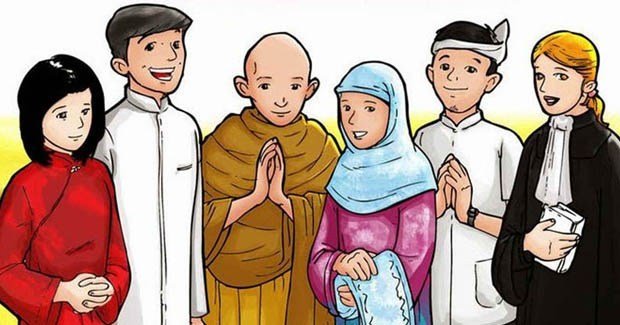
Civis 001/2016
(Republika, Tuesday, October 13, 2015)
And the situation can become worse and more dangerous when politicians misuse religion for their own pragmatic interests. As long as this attitude remains among the so-called religious people, there is no hope that peace will come into reality.
By coining the phrase Bhinnêka tunggal ika, Mpu Tantular initially wanted to see that between Hindus (especially Shivites) and Buddhists could live in peace and harmony in the kingdom.
When at the end the kingdom of Majapahit came to collapse, not because of religious conflicts between Hindus and Buddhists, but because of the rise “of Malacca as a commercial center and a nucleus for the diffusion of Islam.”
Another factor responsible for “Majapahit’s decline was the war of succession” between the Majapahit’s political elites. The third reason for the collapse of Majapahit “was the effort China made, under the emperor Yung Lo, to supplant Java as suzerain over the archipelago and on the peninsula: to effect this was one of the aims of the famous missions of the eunuch Cheng Ho, which resulted in the sending of various embassies to China from former tributaries of Majapahit.” (See G. Coedes, The Indianized States of Southeast Asia, edited by Walter F. Vella and translated by Susan Brown Cowing. Honolulu: East-West Center Press, 1968, p. 241.)
Although the kingdom of Majapahit had entered the museum of history, Mpu Tantular’s Bhinnêka tunggal ika has survived in Indonesia until now. Though formulated by a Buddhist poet, the whole Indonesian people have accepted the Bhinnêka tunggal ika as their own historical heritage, something crucially paramount for promoting religious freedom, social harmony, and tolerance in this country.
When Islam and Christianity came to this archipelago several centuries in the past, the socio-cultural roots of Hinduism and Buddhism remained strong and the daily behavior of the common people was still influenced by these Indian cosmopolitan religious values.
It took a very long time for Islam and Christianity to replace the dominant position of both Hinduism and Buddhism. Islam has, in particular, since about the 17th century, become the most influential religion in this archipelago. Its great success achieved was not by war, but “through penetration pacifique, tolerant, et constructive,” as Yosselin de Yong rightly said.
Because of this phenomenon, the main character of Indonesian Islam has truly been peaceful and tolerant until the very recent time when some Muslim splinter groups took blindly a radical ideology from abroad as their political philosophy for brutal and violent actions. In this case, religion is a danger and a curse for human life.
By putting aside the imperialistic aspect of European Christians, Christianity itself is a religion of peace, tolerance, and harmony. The phrase “You shall love your neighbor” is one of the theological evidences that Christianity is basically a peaceful religion. (In Matthew 5: 43-44, we read: “You have heard that it was said, ’you shall love your neighbor and hate your enemy.” But I say to you, love your enemies, bless those who curse you, do good to those hate you, and pray for those who spitefully use you and persecute you.”)
Similarly, Islam by definition means peace and the total surrender to the will of God. The Qur’an as the primary source of Islam in one verse strongly emphasizes: “There shall be no coercion in matters of religion.”( Qur’an, chapter al-Baqarah (2): 256).
This article has been published in the Resonansi Column, Republika Daily on October 13, 2015, titled “Religious Freedom, Tolerance, and Radicalism (II)”. (Source:www.republika.co.id)

Prof. Dr. H. Ahmad Syafii Maarif, MA
Founder, Maarif Institute for Culture and Humanity
The founder of Maarif Institute for Culture and Humanity; President of World Conference on Religion for Peace (WCRP); The leader of Muhammadiyah , one of the two biggest Moslem organizations in Indonesia (1998 – 2005).
